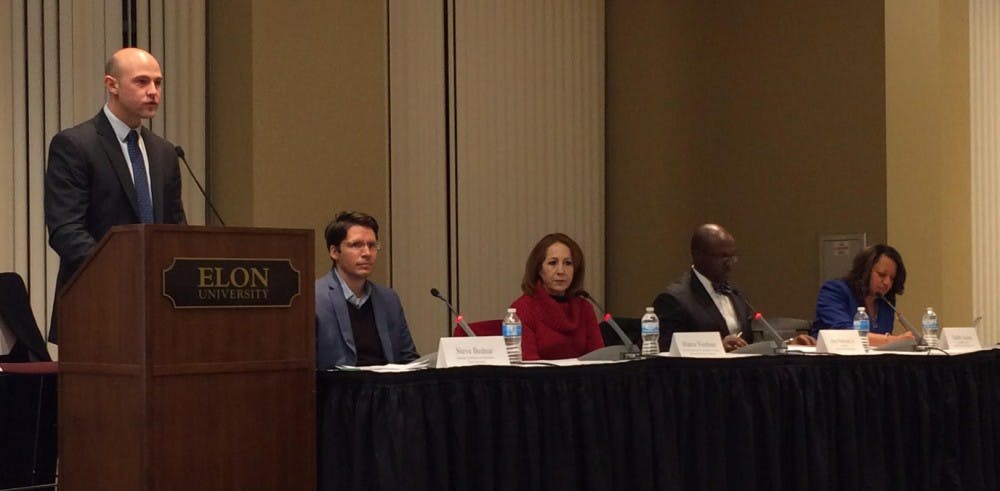The Burlington Times-News and Elon University partnered together Tuesday night for the latest Community Connections installment. With business, economics and race at the front of the conversation, four panelists explained the need for more leadership at the local level.
“It starts with leadership and owning up to policies and practices,” said Shelby Scales, president and CEO of the Airport Minority Advisory Council .
The panelists explained the need for businesses, colleges and the Alamance County community to do more to address the problems minorities encounter on a daily basis.
Blanca Nienhaus, founder and general coordinator of Latinos Unidos Promoviendo Esperanza (Latin United Promoting Health), described the struggles she faced when moving to the United States from Mexico.
“When I came here, I thought that there was just one [America],” Nienhaus said. “When I came here, I had to learn to become something that I never was in my life. I had to become part of a minority.”
Nienhaus said she was forced to adapt to a “whole different ballgame.” Many of the panelists described some of the disadvantages of being a minority in Alamance County.
Scales argued several institutions of higher education aren’t preparing students for the needed jobs of the future.
“Universities have lost touch with the marketplace,” Scales said. “I see community colleges jumping in for what communities are calling for.”
Steve Bednar, assistant professor of economics at Elon, added that existing educational gaps between whites and people of color is another major issue in need of attention.
“When children enter kindergarten, there’s not a huge advantage,” Bednar said. “But within the first two years of education, the gap starts to widen. We’ve seen huge impacts of Head Start.”
The Head Start Program provides early childhood education and health and nutrition services to low-income children and their families. But access to such programs or quality schools is not possible for many families.
One of the attendees said she lives in a poorer area of Burlington where many families are unable to drive their children to and from school. While parents can choose a school for their children to attend, they may have little to no options in the decision-making process if they live far away from high-quality schools.
“At least among lower-income families, choice is not a choice if you have to provide transportation to get to a school that is outside your immediate neighborhood,” said panelist John Peterson, Jr., president of Peterson Nationwide Agency.
As the event progressed, the four panelists fielded questions from the audience. One of the more salient moments of the night emerged when Elon University junior Ifeanyi Obi explained hardships he has run into as a young entrepreneur and full-time student.
He described how he has applied for university grants but has failed to get them approved. He asked what he should do to keep his dreams alive given that the opportunities afforded to him have not panned out.
Peterson and Nienhaus invited Obi to speak with them individually after the session for specific guidance and explained how Obi’s dilemma highlights a larger problem of supporting entrepreneurs and African-American males.
Peterson said African-American men are at the top when it comes to anything negative, such as unemployment. He added that African-Americans are often at the bottom when it comes to anything positive, such as income.
The solutions to these issues lie in different minority groups working together, according to Nienhaus. She shared an experience of attending a conference where Hispanics and African-Americans unite to support one another’s efforts for racial equality.
“During those couple of days, I got to see African-Americans and Hispanics holding hands, hugging each other and learning that they were pretty much the same.”
Each of the panelists concluded the event by stating their visions for creating a more equal and tight-knit Alamance County. They agreed economics was the central issue.
“A lot of things we are talking about will start to get fixed purely on the basis of economics,” Peterson said.


